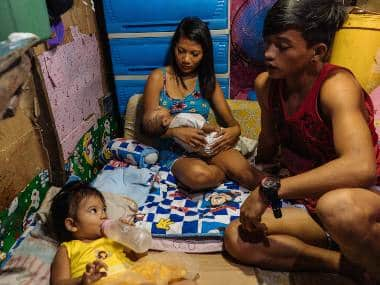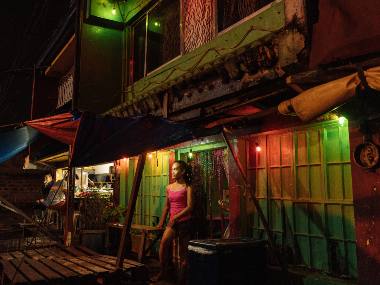Manila, Philippines: The fishing is best on nights like this when the moon is a sliver in the sky, and at midnight in the Philippines’ largest fishing port, the atmosphere was frenetic. Dockworkers in thick rubber boots emptied the catch from the rusting vessels crowded against the pier. Into hundreds of plastic pails lined up in rows, they tossed grouper, barracuda, tuna, flying fish, moonfish and sardines: 300 tons of fish on an average day. Women in slime-streaked aprons, pockets stuffed with cash, shouted orders and negotiated prices, and the returning fishermen soon had money to spend in the nearby bars and brothels. The Navotas Fish Port Complex, a quarter-square mile of crumbling piers, is a vital part of the economy of Manila, the Philippine capital. Last year, the government announced a $270 million plan to rehabilitate the port. But the government’s renewal plans have worried the port’s impoverished residents, who have already suffered tremendous trauma at the hands of the Philippine authorities and now fear being evicted. [caption id=“attachment_8220651” align=“alignleft” width=“380”]  The Market Three slum in Manila. Image: Hannah Reyes Morales/The News York Times[/caption] Inside the port is one of Manila’s most notorious slums, Market Three, which has a reputation in the capital as a lair for drug dealers and hit men willing to kill someone for $100. When President Rodrigo Duterte questions the humanity of the people being shot by the police in his anti-drug campaign, in which at least 6,600 people have died, he’s aiming his slurs at people like those in Market Three. “What crime against humanity?” Duterte said in defence of his anti-drug campaign. “I’d like to be frank with you, are they humans?” At the height of the government’s crackdown in 2016 and 2017, Market Three, named after the nearest pier, was an epicentre of the killings, even though the majority of the 1,000 or so families living here had nothing to do with the drug trade. There were bodies found floating in the water, while other people were killed inside their homes, as many as five in a night. While residents blamed the police for many of these summary executions, in most cases, the killers were never identified. But the people of Market Three were certain it was the police who smashed open their doors during raids in the middle of the night, wearing masks, carrying guns and shining flashlights into their faces. Because people couldn’t quite discern why the police or their proxies were killing some and not others — mistaken identity or disproportionate punishment were frequent guesses — the raids filled the whole slum with a fear that death could happen at any time, for any reason. There’s less of that now. While the government’s deadly anti-drug campaign goes on, the police focus has shifted to other areas of the country and to other targets. Just on Wednesday, Duterte ordered the police and the military to shoot people protesting the nation’s lockdown over the coronavirus. “We’re still scared,” said John Felix Eduarte, 18, who grew up inside Market Three. [caption id=“attachment_8220451” align=“alignright” width=“380”]  John Felix Eduarte with his partner and their two children. Image: Hannah Reyes Morales/New York Times[/caption] When he was a child, he scoured the nearby piers for dropped coins and fish that slipped out from a pail. He sold them and used the money to gamble for penny stakes. At the port’s ice plant, he packed shaved ice into balls, and threw them at his friends. Or he hitched rides on sea bound fishing boats, leapt off into the bay, and swam back to the docks. It’s too dirty now to swim. “If you swallow the water, you’ll definitely throw up,” Eduarte said. And like many of Market Three’s resident, he now works on the docks, hoisting crates, pulling 80-pound pails of fish and shoveling ice. The port proper is connected to Market Three by a narrow cement path that wends between an overgrown empty lot known as the Mountain, a permanent black puddle the size of a swimming pool, and the port’s 20-foot-high outside wall. When Eduarte was 15, he met Merry Punio, then also 15, at a karaoke stall. They had the same favorite song. They were both dating other people, but soon they were singing duets, and a week later, started dating each other. Punio isn’t from the fish port and had sworn she would never go inside one of Manila’s most dangerous neighborhoods. But when her sister moved there, she visited, and found something unexpected. “It’s a happier place than outside,” she said. The alleys of Market Three function as a communal living room. On a visit, a group of women played poker around a plastic table, their banter breaking out into peals of laughter. A few boys practiced break dancing, and a man shaved in the reflection of a broken off car mirror. One boy wiped the bleary eyes of his baby sibling, just woken up from a nap. During Market Three’s feast day in November for its patron saint, Our Lady of Remedies, children play agaw buko, a game involving a battle to grasp a greased coconut. Others line up for pukpok palo, using a stick while blindfolded to break a clay pot filled with flour. Drawn by this street life, and willing to overlook the dangers for love, Punio moved in with her boyfriend, and they now have their own place, a tiny space shorter than they are tall, underneath the home of Eduarte’s father. Many poor Filipinos don’t have weddings or official marriage certificates, but within a year, she and Eduarte were calling each other husband and wife. She stopped going to school, angering her parents. They had a baby named Chloe. They didn’t know how to bathe her or how to feed her. “Everyone here helped us,” she said. “You’re never left alone.” Eduarte’s uncle got him a job unloading crates of fish. He makes between nothing and $4 a day, $20 on really busy days. It’s enough for him, Merry, Chloe and Yhuan, their infant son. The port is a 24-hour operation, and the people who use shabu, the local variant of meth openly sold in the area, say it helps them stay alert for the midnight rush and gives them strength to haul heavy pails of fish until dawn. On his way to work at 5 a.m. earlier this year, Eduarte stepped over a puddle of blood. A man had been shot in a dispute between drug dealers on the Mountain. Given the amount of blood, Eduarte doubted the victim survived. Daisy Maraguinot, 45, a longtime resident of Market Three, dismisses the need for shabu to get by on the docks. “There are plenty of people who do the work without drugs,” she said. She mostly leaves the drug dealers of Market Three alone, but she’d like them gone. Since the government announced its rehabilitation plans for the fishing complex, Maraguinot, the president of an organisation that supports rights for the area’s informal settlers, has been negotiating with the port authorities not to demolish their homes. It’s a battle to convince the authorities that, as workers, they’re valuable to the fish port, and that they deserve a place to live nearby. “Of course we don’t want to live like this,” Maraguinot said. “We want a decent place to live. But we need to make a living more.” Last year, the police installed a CCTV camera inside Market Three. Maraguinot doesn’t trust the police. They’ve killed her friends and neighbors, and when they did their raids, cellphones and televisions disappeared with them. But if they were here to arrest the drug dealers, Maraguinot was willing to give them a chance. Since then, they’ve arrested dozens of people, including children. With the coronavirus having shut down much of the Philippines, the residents of Market Three feel abandoned by the government, Maraguinot said, with many in the community surviving only on privately donated rice. While the fishing port remains open, many day labourer jobs have dried up. “We can die of COVID-19,” Maraguinot said, “but we’re more likely to die of hunger.” Aurora Almendral and Hannah Reyes Morales c.2020 The New York Times Company
Market Three, which has a reputation in the Philippines capital as a lair for drug dealers and hit men willing to kill someone for $100.
Advertisement
End of Article


)

)
)
)
)
)
)
)
)



